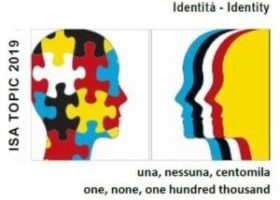The Institute of Advanced Studies of the University of Bologna presents the ISA Topic “Identity: one, none, one hundred thousand”, a cycle of initiatives dedicated to the problem of the continuous definition and redefinition of the different identities that characterize people, society and knowledge. The events will take place from October 2019 to summer 2020.
FLUID IDENTITIES: HISTORICAL AND CURRENT REPRESENTATIONS AND PERSPECTIVES
OCTOBER 24 – NOVEMBER 12— DECEMBER 6 — MARCH 2020
Hospitality and Cultural Heritage – OCTOBER 24, 2019, 10.00 a.m. – 5.00 p.m. – ISA – Sala Rossa, Palazzo Marchesini, via Marsala 26, primo piano, Bologna, Italy
Content description
International workshop and interdisciplinary laboratory realized in collaboration with the NGO Heritage for Peace, this initiative intends to demonstrate how cultural heritage can act as a tool for social integration and how it has already served this purpose in the past. In today’s society, migratory and reception /inclusion phenomena require the awareness that the individual no longer has a well-defined identity but, faced with the risk of losing it and no longer having any (the migrant), can and must assume it multiple identities, from that of origin to those of the new reality of which she/he is a guest and to which she/he can usefully contribute with her/his own experience of life and knowledge. In the same way the citizen of the host society can and must enrich her/himself culturally and not only by contact with other realities, thus acquiring new identities in addition to and complement her/his own. Some of the most important experiences at the European level of enhancement of the museum as a place of social inclusion, recognition and intercultural mediation will be illustrated: “Multaka: Museum as Meeting Point – Refugees as Guides in Berlin Museums” and “Abuab” (“Doors” in Arabic language), a project that aims to work on the use of cultural heritage as a tool for social integration for refugees / immigrants speaking Arabic, proposed by the Milà Institution of the Fontanals of the CSIC and the University of Girona and with the participation of museums in different European cities. From this point of view, starting from the present workshop and the comparison of experiences, with the collaboration of the scholars involved, it is proposed to create a network to track down and survey the city of Bologna, which has always been a crossroads of multicultural and international experiences thanks to the presence of the University and the Institute of the Academy of Sciences, the testimonies and the presence of other cultures, in collaboration with the Bologna Museums Institution.

